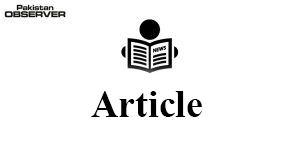Dr Usman W. Chohan
There is a paradox of hunger that pervades our society with respect to the consumption of food. On one hand, we are categorized among the hungriest and food-scarce on earth; and on the other, we let an even more astonishing amount of food go to waste. According to the Global Hunger Index Rankings (2019), Pakistan now scores a frightening 94/117 countries, which means that its incidence of hunger is comparable to that of North Korea (92) and Ethiopia (97). In fact, South Asia as a whole displays some extremely worrying trends, because on the index Afghanistan (108) and India (102) actually fare even worse than we do.
India in particular sets a horrifying example because, instead of diverting the necessary resources to addressing regional hunger, it has become the largest arms importer in the world (12% of the entire world’s purchases), exemplifying the folly of violent choice in the axiomatic “guns vs. butter”. The Global Hunger Index hinges on three factors: undernourishment, child-mortality and undernutrition; and since coming to office, the current government has laid a strong emphasis on addressing these factors. In his first televised speech after assuming office, PM Imran Khan memorably held up diagrams of the stunted child’s brain to the screen, showing how important it was to divert the utmost attention to addressing child development and hunger in the country. Some efforts were being made initially and were bearing fruit. For context, in 2017 Pakistan ranked 107th on the same Global Hunger Index. However, exogenous economic forces (such as brutal IMF-imposed austerity and its heightening inflationary pressures) and political forces (the illegal and violent annexation of Kashmir by New Delhi) have diverted considerable attention of the government away from addressing the scourge of hunger.
Yet hunger is not the government’s task alone, and the most troubling element of the paradox of hunger in Pakistan is in fact that the public recklessly wastes unfathomable amounts of food in such a hungry country. This grotesque aspect of the public’s character is revealed in the statistics that up to 40% of food in Pakistan is wasted (more than 36 million tons of food). Figuratively, this would be akin to seeing every man, woman and child in every city of Pakistan grabbing their plate, walking outside and throwing their food on the street at lunchtime. Yet the question that this society must ask itself is: how can a country so food-deficient also be so wasteful in its dietary attitudes? The answer comes first and foremost from the ostentation of its public practices. Consider how those oily dongas are splurged at in weddings, or any in other social function for that matter. In addition, despite some notable yet small civil society initiatives (e.g. Thali in Pindi-Islamabad), there is no wide-scale initiative for managing food waste. There are lessons to be drawn from countries such as Japan, where not only is hunger minimized and child & adult nutrition prioritized, but food waste is also being actively combated at the governmental and civil society levels. Food wastage currently stands at an estimated 10% of Japan’s food consumption and is falling, even though there is a recognition that still more needs to be done.
Yet we mustn’t make the mistake of presuming that only rich countries can effectively combat hunger and food waste. Cuba, for example, is ranked 5th /117 on the Global Hunger Index, and one isn’t inclined to think of it as particularly rich. Uruguay ranks similarly high and yet it too faces resource constraints. Yet in highlighting these two examples from the Americas, there may also be an opportune occasion to point out that the Global Hunger Index conveniently leaves out a ranking for the United States, as if the figure were too low! This could be further from truth. According to the United States Department of Agriculture (USDA), in 2017, an estimated 15 million households were food insecure, and 40 million people struggled with hunger in the United States, while 45 million Americans rely on stipends from the Supplemental Nutrition Assistance Program (SNAP) to buy food each month. This is the paradox of hunger on an even more exaggerated and brutal scale than witnessed in Pakistan, given the incomparably large economic endowments of the continental US.
Regarding food waste in Pakistan, some steps have been taken towards cautioning the public against food waste. For example, the Punjab Food Authority (PFA) issued the Disposal of Excess Food Regulation 2019 guidelines in February, with a view to minimizing food wastage and focusing in particular on the excesses of hotels, restaurants and banquets. Although they are commendable, these guidelines will not be effective until the bourgeois (and especially nouveau-riche) attitudes that are increasingly manifested in the public sphere aren’t brought to heel. This requires soul-searching as much as a genuine collective commitment towards the austere consumption function exemplified by prophets in scripture. “And do not waste, for God does not love the wasteful,” [Quran 6:141]. Such attitudinal factors are a cornerstone against hunger among the top performers around the world. Even in Japan, the main driver of food waste management is not just government policy (although effective plans have been in motion since 2001), but the spirit of Itadakimasu – “I am grateful for that which I receive.”
–The writer is the Director for Economics and National Affairs at the Centre for Aerospace and
Security Studies (CASS).








